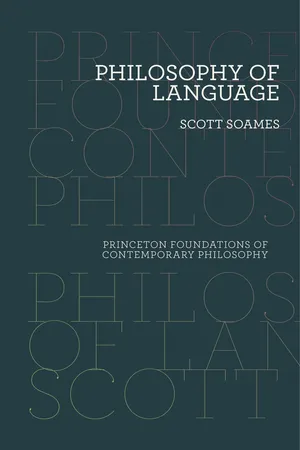![]()
PART ONE
A Century of Work in the Philosophy of Language
![]()
CHAPTER ONE
The Logical Study of Language
1.1 GOTTLOB FREGE—ORIGINS OF THE MODERN ENTERPRISE
1.11 Foundations of Philosophical Semantics
Although philosophers have long speculated about language, it wasn’t until the late nineteenth century that the philosophy of language emerged as a self-conscious and systematic area of study. Four publications by Gottlob Frege marked this emergence. Two of these—Begriffsschrift (Concept-Script) (1879) and Grundgesetze der Arithmetik (The Basic Laws of Arithmetic) (1893/1903)—focused on logic and the foundations of mathematics. Their aims were (i) to set out a formalized language and proof procedure sufficient for mathematics, and (ii) to derive arithmetic from the axioms of, and definitions available in, this system—and thereby to provide a logical basis for all of mathematics. Although the degree to which Frege achieved (ii) is a matter of continuing debate, the degree to which he achieved (i) is not. His systems were the starting points for the stunning development of mathematical logic in the twentieth century, and for the use of logical ideas and techniques in the study of natural languages.
Two further classics, “Function and Concept” (1891) and “On Sense and Reference” (1892a), made contributions to both. In the former, Frege uses the key notion of a function to develop the semantics of his logical language. He begins by refining the prevailing mathematical conception, clearly distinguishing functions from expressions that designate them. He then extends the notion to include functions designated by predicate expressions (the arguments of which are objects and the values of which are truth and falsity), functions designated by truth-functional connectives (which map truth values onto truth values), and functions designated by the quantifiers ‘for all x…’ and ‘for some x…’ (which map the functions designated by predicates and formulas onto truth values). In the end, what we have is not just a calculus with a mechanical procedure for proving formulas the antecedent understanding of which is taken for granted, but also a set of concepts interpreting them. With this, Frege laid the groundwork for the systematic study of the relations between syntax and semantics, form and meaning, and proof and truth.
“On Sense and Reference” extends his approach in two ways. First, meaning and reference are distinguished, with compositional principles determining the meanings and referents of sentences, and other compound expressions, from the meanings and referents of their parts. Second, the ideas of logical semantics are applied to natural language. The resulting picture is one in which the central feature of language is how it represents the world. For a declarative sentence S to be meaningful is for it to represent the world as being a certain way, which is to impose conditions the world must satisfy, if it is to be the way S represents it. Since S is true iff (i.e., if and only if) the world is the way S represents it to be, these are the truth conditions of S. To sincerely accept, or assertively utter, S is (roughly) to believe, or assert, that these conditions are met. Thus, the systematic study of meaning requires the specification of the truth conditions of sentences on the basis of their syntactic structure, and the representational contents of their parts. Frege supplied the rudiments of such a specification.
1.12 Frege’s Distinction between Sense and Reference
Sentences represent the world because they are made up of words and phrases that stand for objects, events, concepts, and properties. Since meaning is representational, it may seem that what these expressions stand for (refer to) is what they mean. However, this leads to a problem, known as “Frege’s puzzle,” which led him to distinguish meaning from reference. The puzzle involves explaining why substitution of coreferential terms in a sentence sometimes changes meaning. For example, Frege took it to be obvious that the (a)/(b) sentences in (1–3) mean different things, even though they differ only in the substitution of coreferential terms.
1a. The author of Life on the Mississippi was the author of The Adventures of Tom Sawyer.
b. The author of Life on the Mississippi was the author of Life on the Mississippi.
2a. Mark Twain was the author of Life on the Mississippi.
b. Mark Twain was Mark Twain.
3a. Samuel Clemens was Mark Twain.
b. Samuel Clemens was Samuel Clemens.
His contention is supported by three facts: (i) one can understand both sentences, and so know what they mean, without taking them to mean the same thing (or agree in truth value), (ii) one who assertively utters (a) would typically be deemed to say, or convey, more than one who assertively utters (b), and (iii) one would standardly use the (a) and (b) sentences in ascriptions,
A believes that S
, to report what one took to be different beliefs. If this is sufficient for the sentences to differ in meaning, then T1, T2, and T3 cannot jointly be maintained.
T1. The meaning of a genuine referring expression (singular term) is its referent.
T2. Both singular definite descriptions—i.e., expressions of the form the F—and ordinary proper names are genuine referring expressions.
T3. The meaning of a sentence S (or other compound expression E) is a function of its grammatical structure plus the meanings of its parts; thus, substitution of expressions with the same meaning doesn’t change the meaning of S (or E).
Frege rejects T1. For him, the meaning of a name is not its bearer, and the meaning of a definite description is not what it denotes. Instead, meaning determines reference. The meaning, or sense, of ‘the largest city in California’ is something like the property of being a California city larger than all others. Its referent is whatever has this property—Los Angeles. Although different terms with the same sense must have the same referent, terms with the same referents may have different senses, which explains the meaning difference between (a) and (b) in (1) ...


